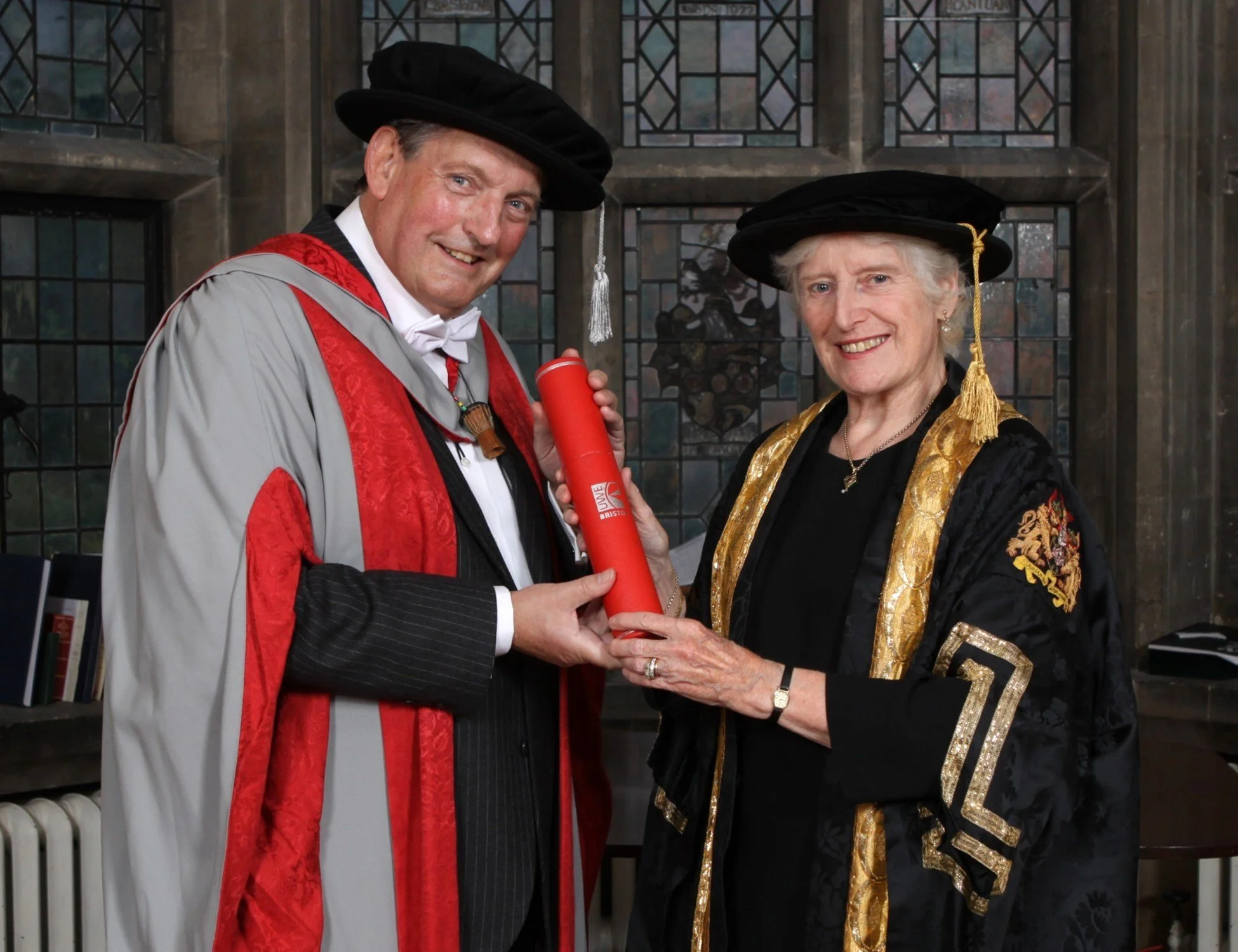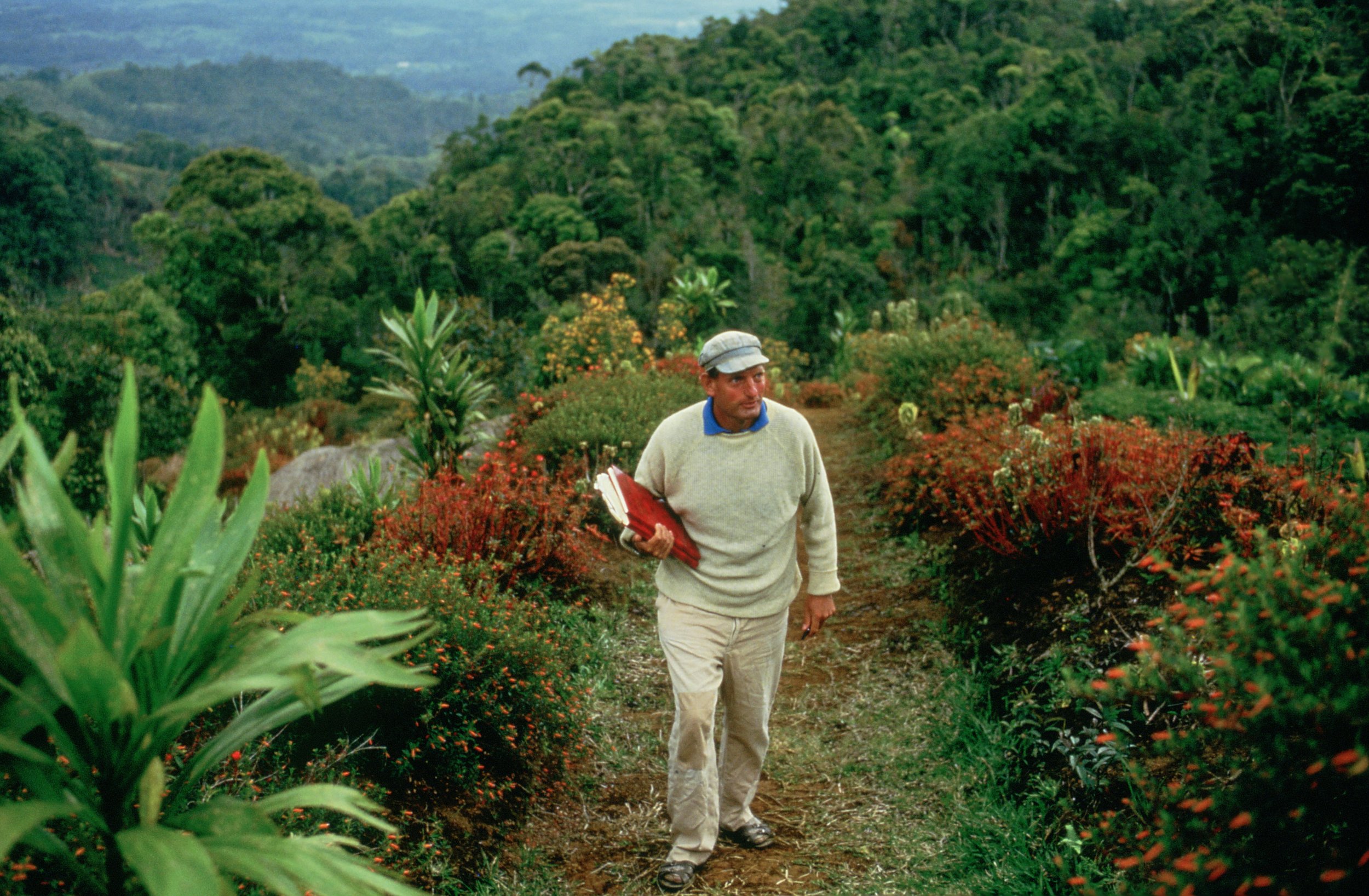Biography
Dr David Fanshawe, Composer & Explorer (1942-2010)
David Fanshawe is best remembered for his legendary choral composition African Sanctus and his great legacy to World Music The Fanshawe World Music Archive, a vast archive of 3,200 recordings of indigenous music, 40,000 images and 70 hand-written journals.
He will also be remembered for his charismatic personality and captivating performances, his inspiring speeches and presentations to schools and festivals, and at fundraising and corporate events around the world.
Fanshawe composed more than 50 film and television scores and around 25 other compositions, and his discography comprises over 30 CDs. His work has inspired award-winning documentaries and has attracted worldwide recognition including a great number of international awards, among them a Churchill Fellowship, an Ivor Novello Award, and an honorary DMus from the University of the West of England (UWE).
Read More
David Fanshawe married Judith Croasdell Grant in 1971 with whom he had two children, Alexander and Rebecca. He also had one daughter, Rachel, with his second wife, widow Jane Bishop (née Walton) whom he married in 1985. Jane and Rachel now live in The Malverns, England, the current home of the Fanshawe Collections.
David Fanshawe was born in 1942 in Paignton, grew up in Camberley, and was educated at St George’s Choir School Windsor and Stowe. He started work in 1959 as a trainee film editor and sound recordist, first for the Film Producers Guild then at Merton Park Studios. He spent the next few years honing his editing skills and taking piano lessons with a teacher he happened to meet by chance. She was composer and pianist, Guirne Creith, who saw in Fanshawe more promise as a composer. Then, in 1965, on the strength of performing his own compositions, he was awarded a Foundation Scholarship to the Royal College of Music to study composition with John Lambert. Fanshawe’s early works for orchestra were Dover Castle and Requiem for the Children of Aberfan, which was first performed by the College orchestra, conducted by Harvey Phillips. Among the many film and television scores he produced throughout the ‘70s were Stephen Frears’ films Three Men in a Boat and A Day Out for BBC TV, Flambards and The Good Companions for Yorkshire TV, and David Cobham’s film Tarka the Otter. In 1966 David made his first journey to the Middle East where his ambition to record indigenous folk music began. The following year he returned with his tape recorder and made his first recordings in Bahrain. Between 1969 and 1975 he travelled through North and East Africa where he recorded over 400 hours of music. He was supported by the Ralph Vaughan Williams Trust. “When the committee heard of David Fanshawe’s plan to travel down the Nile to collect and record the music native to the countries in those still remote areas, we were both interested and impressed by his project. We knew, too, from the examples of collectors of folk music working at the beginning of this century, what musical treasures have been rescued from oblivion in our own islands, in America - from the descendants of the early settlers and from Europe, where musicians of the stature of Bartok and Kodaly devoted much time to this work. So we were glad to be able to help.” Ursula Vaughan Williams
During this period David Fanshawe composed an African trilogy that began with Salaams - a musical essay based on the chants of the pearl divers of Bahrain. It is dedicated to John Lambert, who conducted the première performance at the Queen Elizabeth Hall in May 1970 and the subsequent recording (Philips) with Fanshawe as soloist in the cantor role. It was Salaams that first brought Fanshawe national recognition. Significantly, it is his first work scored for pre-recorded tape and in a ground-breaking way: a departure from the ‘electronic music’ of the ‘60s and ahead of the time when World Music, as we know it today, exploded on to the scene in the late ‘80s and ‘90s. Unlike earlier ‘music explorers’ - Ralph Vaughan Williams, Percy Grainger, George Butterworth - David Fanshawe lived in an age of technology. With his tape recorder, not only did he record indigenous music, but he has preserved authentic live performances in his field recordings. It is his use of these recordings that brings a whole new dimension to this genre, particularly in African Sanctus. In his 1974 forward to Fanshawe’s book African Sanctus the late Sir Keith Falkner, Director of the Royal College of Music, wrote “David is perhaps the most original, independent and self-reliant young man I have known; a visionary with the character and tenacity to convert his visions into reality.”
Completing the trilogy is Arabian Fantasy, a commission from Naim Attallah, to whom the work is dedicated. Arabian Fantasy, a set of variations on an Arabian theme, is based on instrumental folk music recorded in Egypt and became the subject of a BBC/Namara Entertainments documentary film. Owain Arwel Hughes conducted the première performance at the Royal Albert Hall in 1976. “Let my music embrace the spirit of the sirocco and harmonise people and their musics from east to west.”[DF]
In 1978 David Fanshawe’s focus shifted from Africa to the Pacific when he made his first visit to Fiji. Based at the University of the South Pacific he embarked on a ten year voyage of research, recording over 25 nations across the Pacific Ocean, which has resulted in a monumental archive. His research was the subject of the 1987 award-winning documentary films Musical Mariner 1 & 2 (Lucky Country), broadcast on national and international TV channels, including PBS’ Explorer Series and National Geographic. The Fanshawe World Music Archive holds thousands of hours of tapes, slides and journals, which have preserved traditional forms of ethnic music-making throughout the Pacific Region. “The cultural significance of David Fanshawe’s work is immense.” National Film and Sound Archive, Canberra The first composition to be inspired by music of the Pacific came as a result of a commission Fanshawe accepted from the distinguished cellist Steven Isserlis CBE. The specific request was for “a primitive, ethnic-influenced piece, with charm - can these elements be combined in one piece?” The Awakening is an Intermezzo for Cello and Piano and is introduced by pan-pipes from the Solomon Islands. Steven Isserlis recorded The Awakening in 1986 with the composer at the piano (Philips). The Awakening is a pivotal work and was to have found its place in Pacific Odyssey, a large-scale work which Fanshawe left unfinished. His last completed work is Pacific Song, which was also to have formed a part of Pacific Odyssey. Inspired by the music of Tonga, it is scored for chorus, flute and percussion. Pacific Song was commissioned by the American Choral Directors’ Association and the première performance was given at its 2007 National Convention in Miami by the Multicultural Honor Choir.
In 1992 Fanshawe returned to England from Australia. He made one further journey through the tropics in South East Asia to record the traditional music of India, Thailand, and Laos, which is documented in the film Tropical Beat (Eclectic Films). After that he returned to his studio, to digitally copying and cataloguing his collections, and to composing. He also fulfilled about 30 speaking engagements a year to give his highly acclaimed illustrated presentation One World - One Music. Fanshawe revised some of his early scores, notably Tarka the Otter Symphonic Suite and Dover Castle, an ‘autobiographical’ work, which as if to add his signature to the score, was hand-engraved. During this period Fanshawe composed Dona Nobis Pacem, Fanfare to Planet Earth, Millennium March, Serenata, Trafalgar, Lament of the Seas, and finally Pacific Song.
In 2009 when David Fanshawe was awarded an honorary DMus from the University of the West of England the citation read: “In recognition of his outstanding contribution to bringing music from around the world into the lives of people who neither read nor write music and to his pursuit of musical excellence, which is synonymous with the aims of the University’s Centre for Performing Arts”. The speech he made might apply as well today as it did when he accepted his degree: “In my serendipitous career, through the adventures of Music and Travel, I have been privileged to experience our world as a composer and musical explorer. It is now my humble dream to go on sharing my aspirations with future generations, through the legacy of my Sound Archives; and by fulfilling my life’s missions, which are: to celebrate the universal language of music; to record for posterity endangered World Music, threatened with extinction; to seek inspiration for my own compositions - thus uniting musical worlds apart. Thank you for this quite unexpected honour and tribute.”
by Katharine Copisarow
As published in the programme of Fanshawe’s Royal Festival Hall Celebration Concert in 2012





















